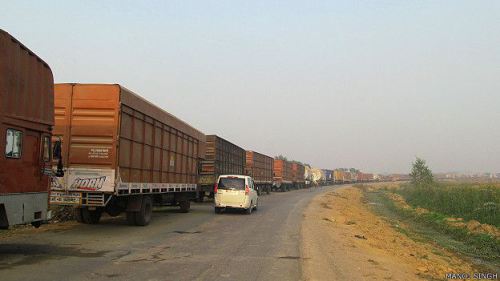By– Anil Yadav
Anil Yadav
(Written by Senior Indian journalist Anil Yadav, this ground report was originally published in BBC Hindi. www.bbc.com/hindi/india/2015/12/151210_nepal_petrole_smuggling_through_pulsar_sr ). This is an English translation by NepalForeignAffairs.com desk.
The slogan of Bajaj’s Pulsar motorbike roars, “Fear the Black.”
In these times of blockade on Nepal, Indian villages surrounding the border town of Sunauli just love this motorbike as the biggest means of petrol black-marketing into Nepal simply because its fuel tank holds 15 liters.
Unemployed and students hire a Pulsar for 300 rupees a day, get the tank filled for 70 rupees per liter and sell it for 125-130 rupees a liter in Nepal right across the border.
Whoever makes more trips makes the evening more colorful. Other motorbikes are also used for petrol smuggling but profits are small because they have smaller tanks.
These boys, driving their motorbikes in high speed, have started wearing masks, not to prevent the dust from the fields but to sneak out of the eyes of extortionate police and berating petrol pumps.
Travel agencies are seen killing time but drivers are making money filling tanks of their taxies.
Blockade on Nepal has produced young investors, whose stories you get to hear at petrol stations. A young man from the village Thuthibari near a small border check-post, 25 kilometers away from Sunauli, had bought a second-hand motorbike for 15000 rupees. Having paid it off, he is now sitting on money.
Nepal’s Madhesi protesters had shot a boy carrying diesel into Nepal from the neighboring village Bargadawa few days ago. The Pulsar-boys refrain from talking about him.
For them, this incident is an exception, which took place not because of smuggling, but of personal fights.
Those unable to manage a motorbike are using bicycles to pass jerry cans filled with diesel. It goes to the extent that the women and girls from poor families have made their day buying 5-7 liters petrol out of borrowed money.
A Chat-boy (Chat is an Indian fast food) has put his cart at the petrol station nearNautanawa bypass, just a little further from the Commandant Office of the Indian Border Security force-SSB.
Until last month, his cart would stand at the gate of a nearby school. The cart-men say, “Where the boys there the cart. Those who never had 10 rupees before are now making 1000-1500 rupees a day.”
Long queue of jerry cans was seen atanother petrol station. The waiting women were asking pump-personnel to fill faster so that they could go into Nepal across the No Man’s Land via paddy fields, do their business and return back before the evening grew dark.
Villages near the borders are quickly filling 1-2 cylinders of cooking gas at homes. One cylinder costs 720 rupees in the black market. It sells for a whopping 1500 rupees in Nepal’s Belahiya across the border. The prices go up to 2500-3000 rupees after they reach Bhairahawa and Kathmandu.
Flourishing black market has given hard time to the businesses in Sunauli. Their support boys have left jobs to join the new opportunity.
There is no sight of rickshaw-pullers in the villages near the border; labors are in scarcity in this season of wheat-sowing. The blockade on Nepal has bestowed them with an unprecedented money-making opportunity.
They want this situation to continue long. They often cite a famous, old saying which means: when you live in border, you make easy money and you need not worry for having no studies.
A villager standing near a private hospital in the town of Farenda said, “India has put Nepal on ventilator-support. The family members of such patients pay any amount of money to the doctors. Nepal is also paying to these villagers.”

